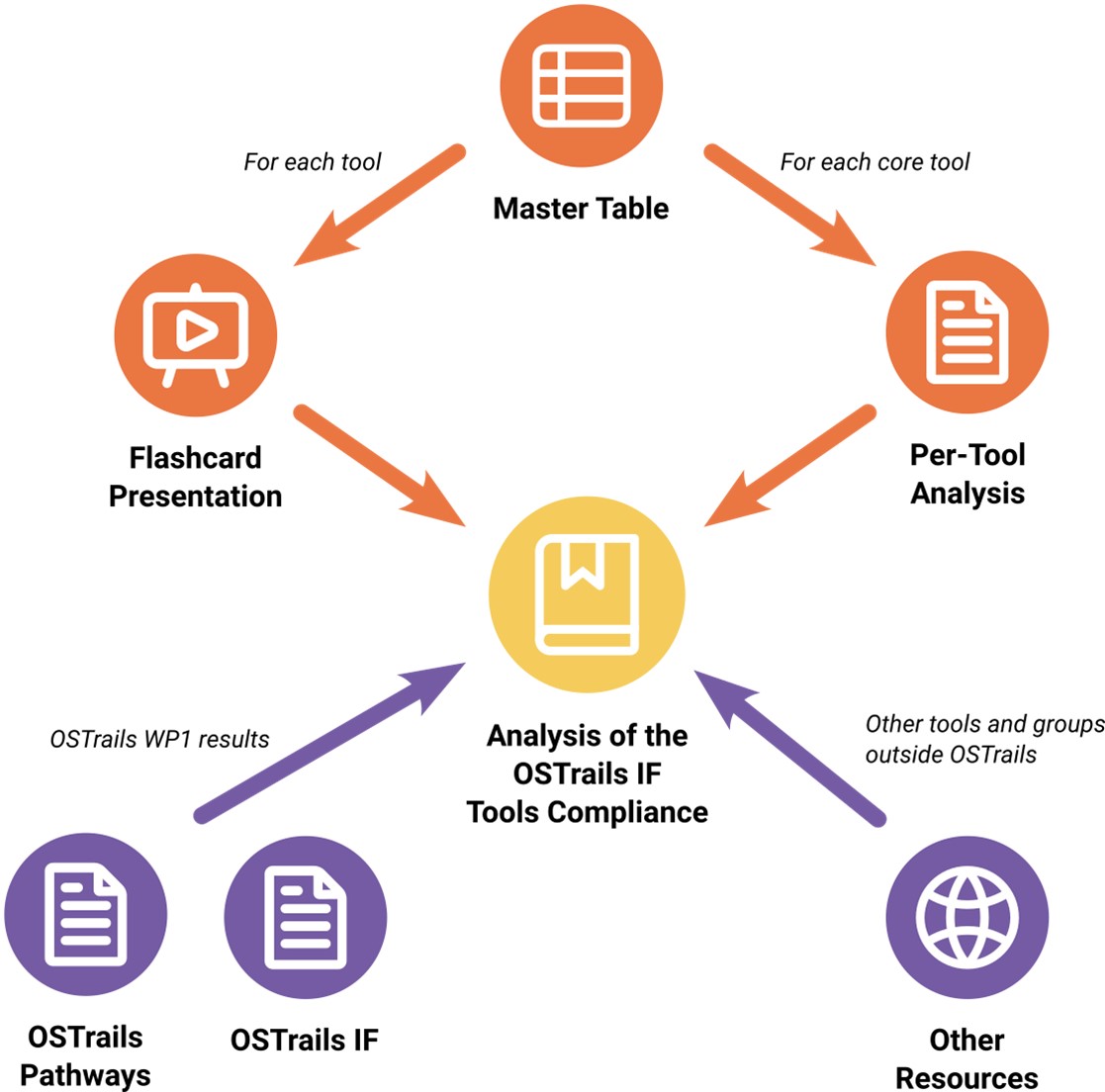Exploring Tool Compliance and our Pilots Methodologies to Implement the OSTrails Results
As part of the ongoing efforts within the OSTrails project, D2.1: Analysis of the OSTrails Interoperability Framework Tools Compliance assess the compliance of tools with the OSTrails Pathways and Interoperability Framework. Interoperabilityplays a crucial role in ensuring that tools and services can communicate and work together without technical barriers, enabling the smooth sharing and exchange of research outputs (such as datasets, software, publication) across diverse platforms— a fundamental aspect of open science. The Pathways, on the other hand, serve as blueprints that map out the interactions between DMPs, SKGs, and FAIR assessment tools, illustrating the sequence of steps and processes necessary to achieve seamless integration and functionality.
D 2.1 evaluates the compliance of 38 tools, including Data Management Planning (DMP) platforms, Scientific Knowledge Graphs (SKGs), FAIR assessment tools, Current Research Information Systems (CRIS), and repositories. Each tool was systematically assessed for its alignment with the OSTrails Interoperability Framework, with the goal of identifying technological synergies, existing gaps, and areas for further development to ensure seamless integration within the evolving RDM landscape.
Key findings from the analysis highlight the broad adoption of core technologies and standards across the evaluated tools. However, gaps remain in areas such as comprehensive notification systems, variability in provenance documentation, and the need for continuous updates to meet emerging standards. Addressing these gaps will be critical to fully realising the OSTrails vision of interoperable data management solutions. The evaluation process followed a structured methodology, as shown in Figure 1.
 Figure 1. Tool evaluation process (source D2.1).
Figure 1. Tool evaluation process (source D2.1).
A Master Tablelisted all tools from the project’s national and thematic pilots, distinguishing core tools from additional ones and updating it as tools evolve. Tool representatives provided one-slide summaries (Flashcards) with essential details, allowing for quick understanding of each tool’s functionalities and use cases. A detailed analysis of each core tool (Per-Tool Analysis) was conducted, which focused on compatibility with standards, data formats, integration, and other interoperability issues. The final report (OSTrails IF Compliance Analysis) consolidates findings from individual analyses, aligning tools with the OSTrails Interoperability Framework and incorporating feedback for refinement.
D 2.1 lays the groundwork for future developments aimed at enhancing interoperability across the RDM landscape, reinforcing OSTrails’ commitment to driving innovation and collaboration within the open science community.
For more information on OSTrails’ Pathways and Interoperability Frameworks, check out D1.1: Plan-Track-Assess Pathways and M4: Interim Products Establishment for Cross-Task Collaboration.
D4.1: Pilots Methodology and Operational Processes the methodology and processes for implementing the 15 national,8 thematic, and Horizon Europe pilots under WP4. The pilots will demonstrate the benefits of the OSTrails PTA framework, serving as a foundation for testing the OSTrails solutions developed in WP 1-3. Each pilot will contribute according to their national contexts and needs, which are outlined in this deliverable.
All 15 national pilots are focused on developing maDMP templates tailored to national funder requirements and local infrastructure, streamlining RDM processes and enabling researchers to manage their data effectively in compliance with funder guidelines. Several pilots are working to integrate DMP tools with national infrastructures, including CRIS (Current Research Information Systems), repositories, and other data services. A major focus for pilots in Spain, Poland, France, and Germany is improving the FAIRness of research data by developing FAIR evaluation tools, establishing FAIR metrics, and assessing how to ensure data is accessible, interoperable, and reusable across different platforms and systems. Many pilots aim to increase collaboration between national stakeholders, such as universities, funders, and research infrastructures to reduce the administrative burden on researchers and enhance the quality and accessibility of research outputs. Pilots in Serbia and Greece, among others, are working on enhancing repository and CRIS systems by linking DMPs with other research outputs like datasets and publications. Additionally, pilots throughout the project are actively testing and evaluating the RDM platform onboarded to the project, integrating it with lab notebooks, and conducting FAIR assessments of digital objects stored in repositories.
Eight thematic pilots within the OSTrails project have been strategically selected to cover a broad spectrum of scientific domains and organizational contexts, representing the five EOSC Science Clusters. These pilots will co-create, validate, and showcase the effectiveness of the project's methodologies, tools, and frameworks through initiatives such as the development of interoperability standards and the OSTrails Commons. In addition, they will provide continuous feedback to the OSTrails development teams in the technical WPs 1-3. The Horizon Europe pilot will analyse current data management practices and propose updated templates for future projects.
D4.1 also explains in detail the methodology for Cross Pilot and Cross Project Coordination,which aims to foster collaboration and knowledge exchange between national and thematic pilots and across pilots and ensures that technical developments from WP1-3 are integrated into the pilots and that pilots provide valuable feedback for further improvement.
The national, thematic, and Horizon Europe pilots are important to the overall success of OSTrails, providing diverse testing environments for innovative research data management (RDM) solutions developed by OSTrails. These pilots reflect the varied RDM practices across Europe, addressing unique challenges in different research contexts.
